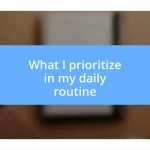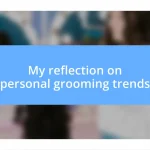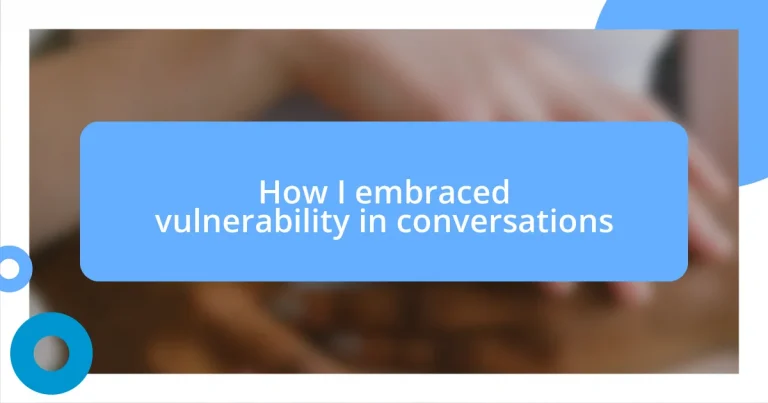Key takeaways:
- Vulnerability is a strength that fosters deeper connections and encourages mutual support in conversations.
- Identifying barriers such as fear of judgment and past negative experiences can help individuals embrace vulnerability for richer relationships.
- Practicing active listening and sharing personal stories enhances emotional connections, transforming conversations into meaningful exchanges.
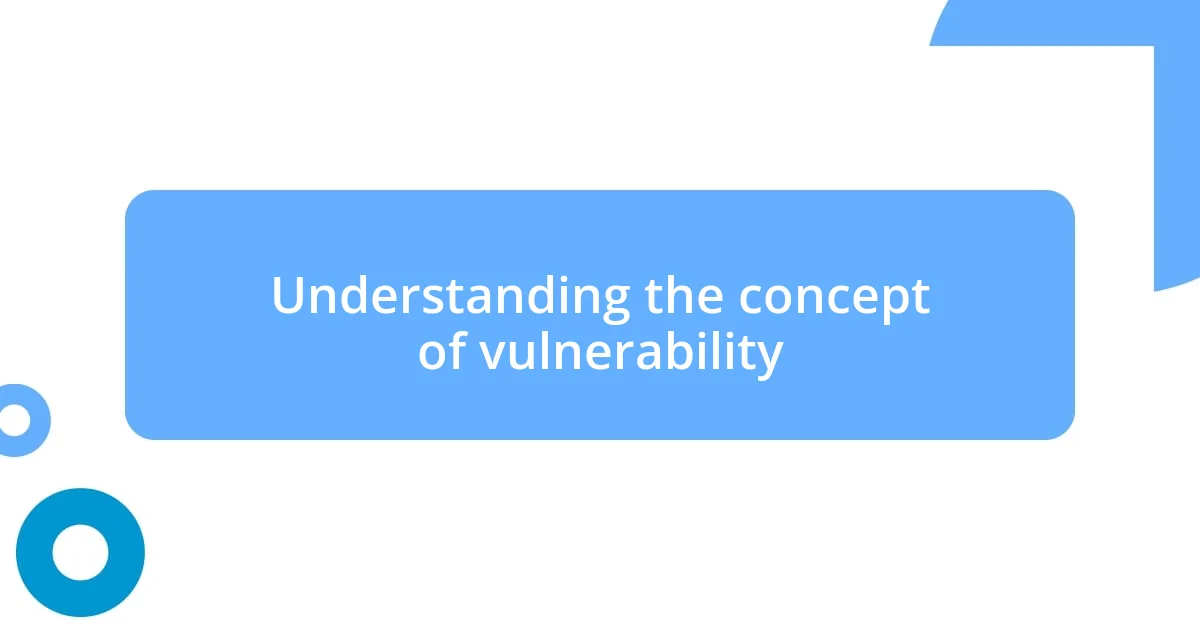
Understanding the concept of vulnerability
When I think about vulnerability, I often recall a time when I shared my fears about a job promotion with a close friend. It was daunting to express that uncertainty, but the relief I felt afterward showed me that vulnerability is not a weakness; it’s a bridge that fosters deeper connections. Isn’t it fascinating how allowing ourselves to be open can invite others to do the same?
Understanding vulnerability means recognizing it as a fundamental aspect of being human. It takes courage to reveal our true selves, especially in a world that often promotes the idea of being invulnerable. I remember feeling a rush of anxiety before admitting my struggles with self-doubt in a group setting, but that honesty led to a profound group discussion, full of shared experiences and mutual support.
Vulnerability can feel like walking a tightrope, and it’s essential to find that balance between sharing and protecting ourselves. Yet, opening up doesn’t always have to lead to discomfort; it can inspire moments of growth and empathy. Have you ever considered how much richer your conversations could be if you dared to peel back those layers and show your authentic self?
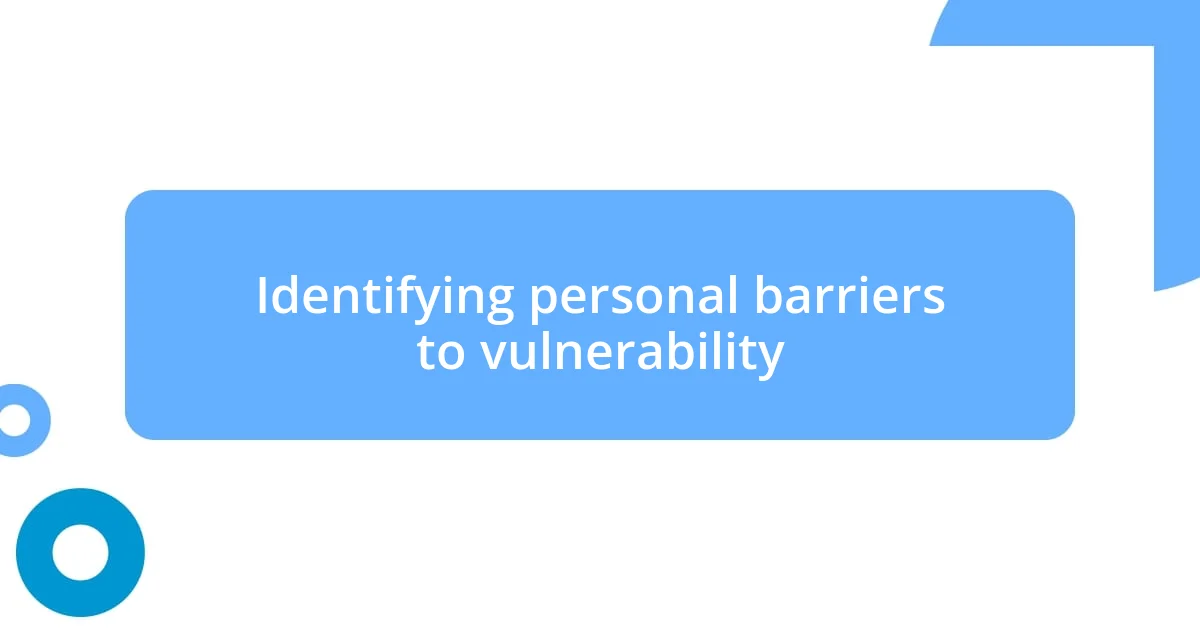
Identifying personal barriers to vulnerability
Identifying personal barriers to vulnerability can be a revealing journey. I remember my own struggles with fear of judgment; it often held me back from expressing my true thoughts in conversations. This fear mirrored a past experience where my honesty during a discussion about my mental health was met with awkward silence, a moment that left me questioning if sharing was worth the risk.
Another barrier I encountered was the fear of intimacy. During a heartfelt talk with a colleague, I hesitated to disclose how much I valued our partnership due to my concern that it might change the dynamic between us. It made me realize that sometimes, vulnerability feels like standing on a precipice—terrifying yet liberating if we allow ourselves to embrace it.
Lastly, I’ve learned that past experiences can shape our reluctance to be vulnerable. Reflecting on a time when sharing a personal story was met with ridicule, I found myself closing off in future conversations to avoid a repeat of that pain. Yet, overcoming these barriers can lead to richer relationships and deeper conversations, proving that vulnerability truly can be a strength.
| Barrier | Description |
|---|---|
| Fear of Judgment | Worrying about how others perceive what we share. |
| Fear of Intimacy | Concern that sharing personal feelings may change relationships. |
| Past Negative Experiences | Previous instances of ridicule that lead to hesitance. |
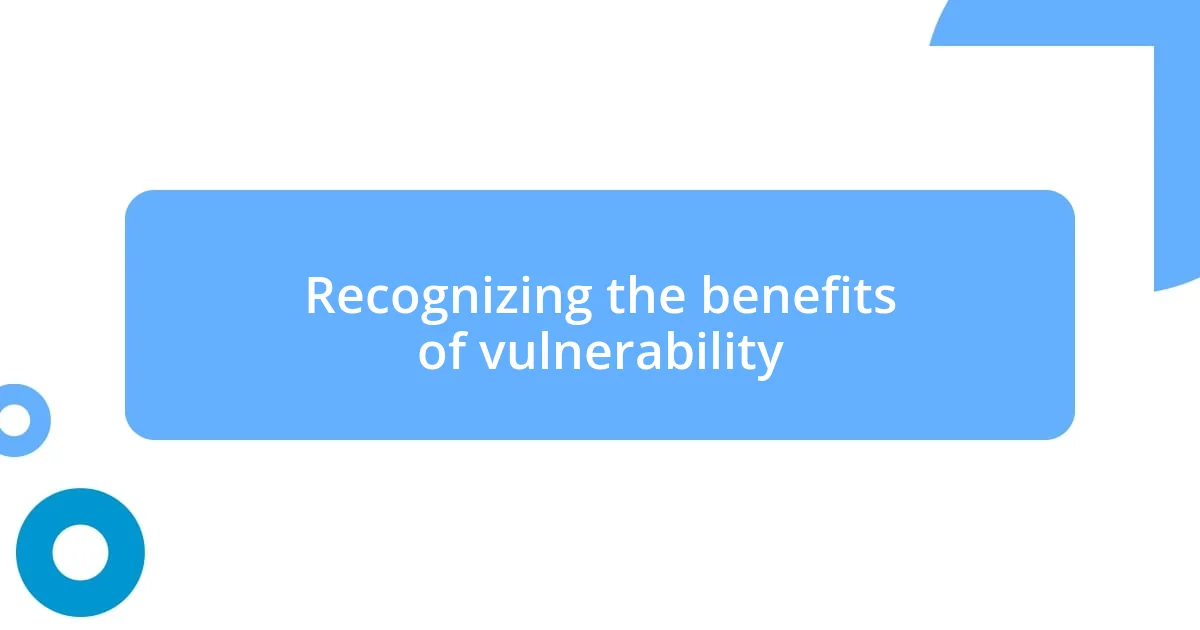
Recognizing the benefits of vulnerability
Recognizing the benefits of embracing vulnerability in conversations is invaluable. I’ve seen how it invites authenticity and trust; I remember a coffee chat when I opened up about my struggles with work-life balance. That small act shifted the conversation from surface-level pleasantries to a heartwarming exchange of personal experiences, allowing us both to feel understood and less alone.
Here are some key benefits I’ve discovered along the way:
- Deepened Connections: Vulnerability fosters a sense of closeness that superficial chats often lack.
- Enhanced Empathy: When I share my struggles, others are more likely to empathize and share theirs, creating mutual support.
- Increased Trust: Being vulnerable signals to others that it’s safe to do the same, cultivating a trusting environment.
Ultimately, embracing vulnerability transforms conversations, making them more enriching and meaningful. When we dare to peel back those layers, we illuminate paths to deeper understanding.
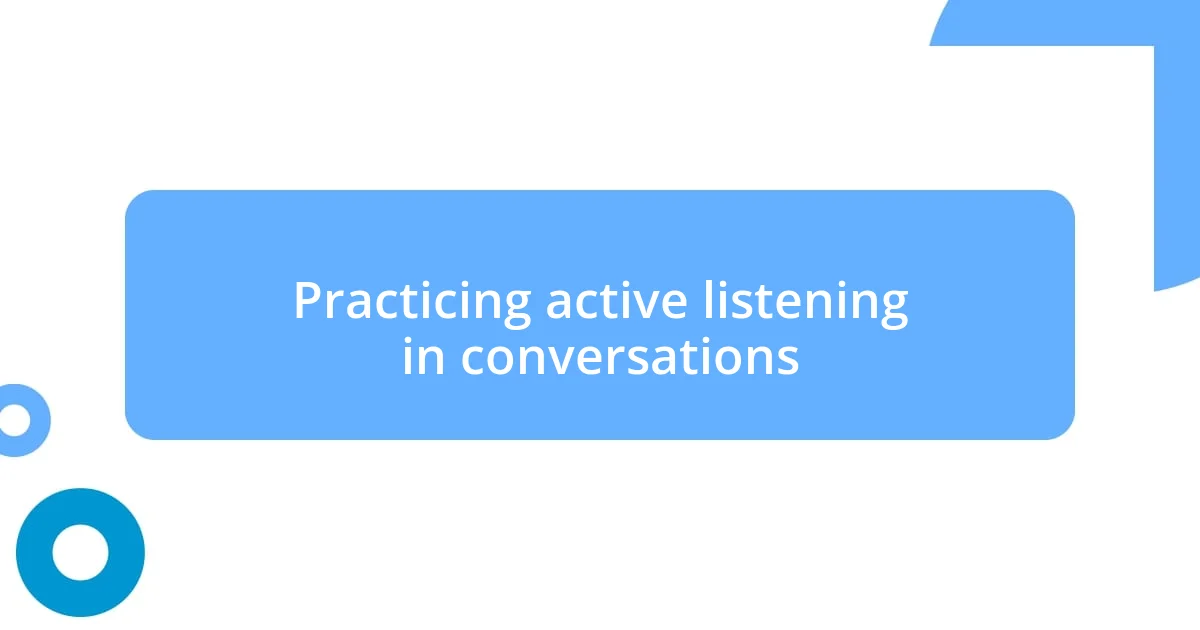
Practicing active listening in conversations
Engaging in active listening is fundamental for meaningful conversations. I distinctly recall being in a heartfelt discussion with a friend. Instead of preparing my response while they spoke, I made a conscious effort to fully immerse myself in their words. This simple shift allowed me to pick up on nuances I might have otherwise missed, creating a stronger bond between us. Have you ever felt that connection deepen when you truly listened?
I also learned that responding with validation can significantly enhance the conversation. One time, my colleague shared a tough experience at work, and instead of jumping in with advice, I merely acknowledged their feelings. It made a world of difference. Hasn’t everyone experienced the relief of having their emotions recognized without the pressure to solve the issue immediately?
Incorporating pauses during conversations has also been transformative. I found that allowing silence for a moment encourages the other person to share even more. I was surprised to experience this during a recent chat with a family member. After I embraced the quiet, they revealed thoughts they had held back before. It made me wonder—what treasures lie waiting in the unsaid, just beyond the pause?
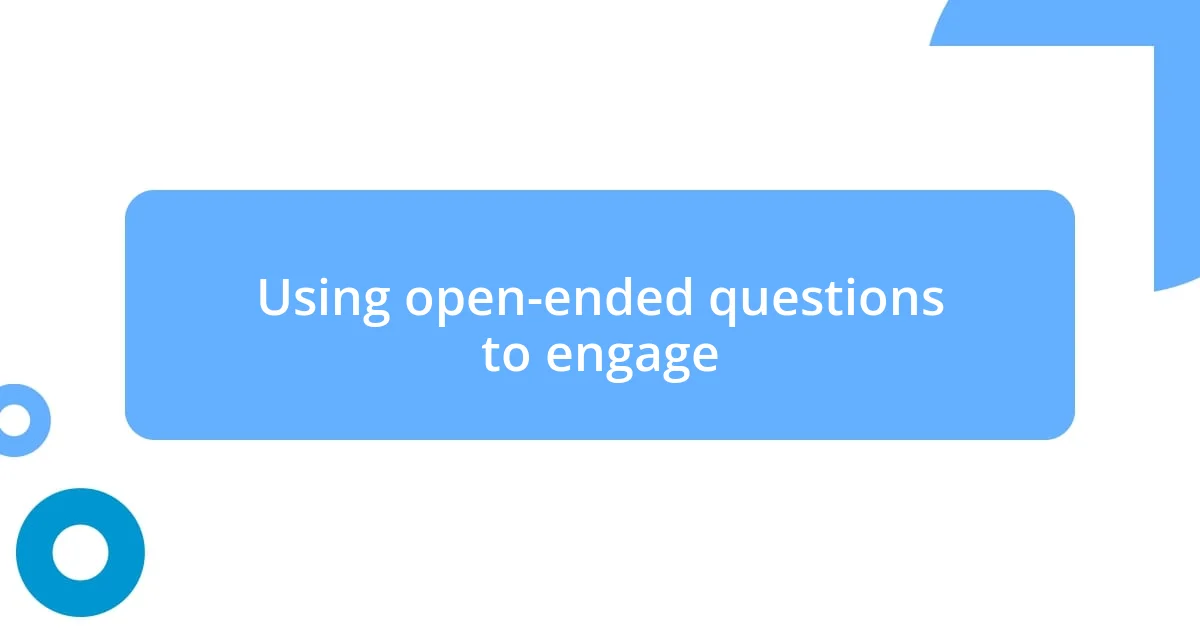
Using open-ended questions to engage
Open-ended questions have been a game-changer for me. I remember sitting across from a friend during lunch when I decided to ask, “What’s been on your mind lately?” The moment the words left my mouth, I could see her face light up. Instead of the typical small talk, we were plunged into a deeper discussion that revealed her recent struggles and triumphs. It’s incredible what can unfold when you give someone the space to share their thoughts freely.
I’ve also discovered the power of curiosity in conversations. Asking questions like, “How did that experience shape you?” invites others to explore their emotions and stories in a way that feels natural. I had a memorable instance with my colleague where I inquired about their journey into our field. The excitement in their voice was palpable—they felt heard, and I learned so much about their passion. Have you ever noticed how a simple question can unlock a new dimension of understanding?
What truly strikes me is how these questions serve as bridges. They connect us to the heart of someone’s experience and allow room for vulnerability both ways. For example, when I asked a close friend about their biggest fear, it opened up a dialogue that not only revealed their anxieties but also made me feel brave enough to share my own. Isn’t it interesting how vulnerability can be contagious, flourishing through conversation?
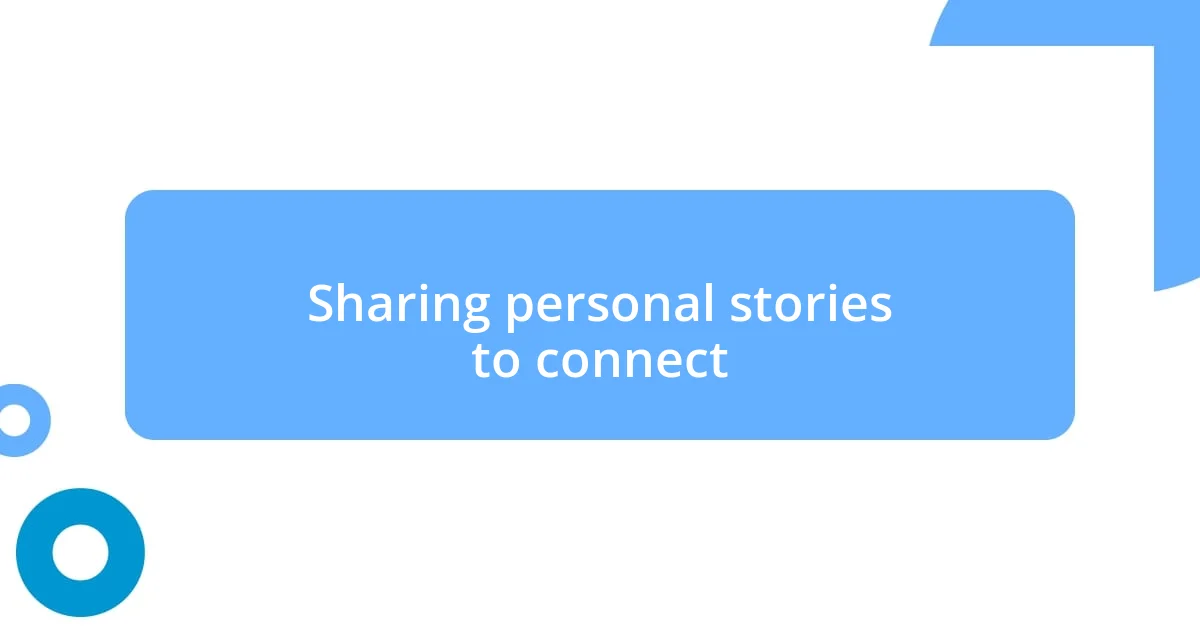
Sharing personal stories to connect
Sharing personal stories fosters an incredible connection during conversations. I still vividly remember sharing a childhood memory about a difficult friendship. My honesty allowed my conversation partner to reflect on similar experiences, leading us to a deeper understanding of our insecurities and triumphs. Isn’t it fascinating how our pasts can intertwine through shared narratives?
One night, I found myself sharing a heartfelt story about my first job and the challenges I faced. The moment I began to speak about my fears of failure, I noticed my friend’s eyes soften. Suddenly, she felt safe enough to reveal her own struggles in the workplace. It struck me then—a simple act of openness can dissolve walls and encourage others to share their truths. Have you ever felt that rush of relief when someone else opens up and you realize you’re not alone in your feelings?
Each personal story we share acts like a thread, weaving our lives together in unexpected ways. I’ve learned that the vulnerability of recounting my struggles not only allows for connection but also sparks meaningful dialogues. After sharing my fight with anxiety, a friend confided her similar battles, transforming our relationship into one of mutual support. What if we all made a pact to tell our stories more often? The possibilities are endless, and the connections we could forge are truly powerful.
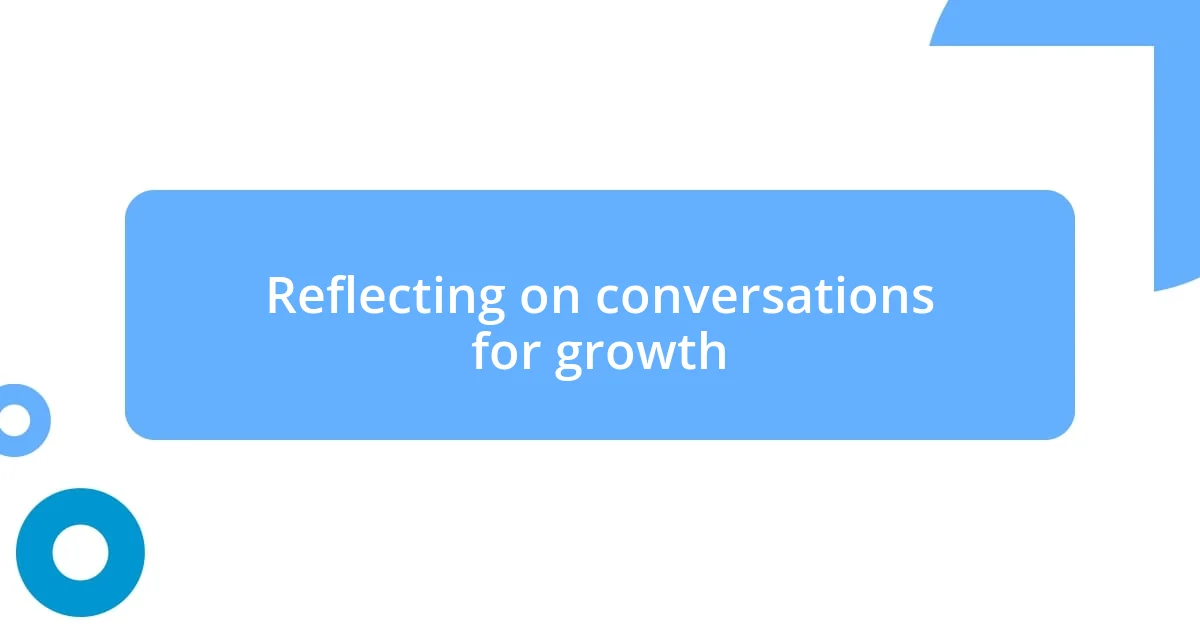
Reflecting on conversations for growth
Reflecting on past conversations has become a vital part of my growth journey. I often find myself revisiting discussions I had, pondering what was said, and considering how I responded. For instance, after a powerful chat with a mentor, I took time to assess not just the feedback they offered but also the emotions it stirred within me. This process of reflection helps me refine my approach to future conversations and deepens my understanding of both myself and others.
I remember a time when a conversation left me feeling unsettled. I had spoken so much about my own experiences that I hadn’t given space for my friend to share theirs. After reflecting, I realized I could improve by being more conscious of balancing dialogue. This awareness transformed my interactions, as I now actively encourage others to express their thoughts, leading to richer exchanges. Have you ever thought about the impact of your conversational style on personal connections?
Engagement doesn’t end when the conversation does; it’s what we do afterward that truly matters. I’ve started journaling my thoughts about specific discussions, noting how they made me feel and what insights emerged. This practice not only solidifies what I learned but also acts as a guide for the values I want to uphold in future dialogues. I believe it’s essential to ask ourselves: what can we learn from our conversations, and how can that inform our growth?

